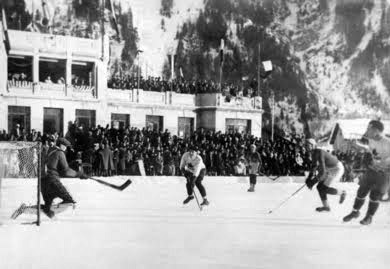The records note his country as Canada, making George Orton the first Canadian to win at the Olympic Games. The Canadian Olympic Association supports that record; it regards Orton as the first Canadian Olympic medalist. But Canada did not send a team to the Olympics in 1900; Canada had no Olympic team until 1904 at the St. Louis games. Orton, a student, competed as part of the University of Pennsylvania team. Because he was entered as an American athlete, it was not until years later that anyone even realized that a Canadian had won an Olympic competition.

|
| George Orton. |
George Orton of Strathroy, Ontario, was an astounding athlete proficient in several sports, including soccer and hockey. He discovered his talent for running as a child when he used exercise, especially running, to overcome injuries sustained in an accident. He competed in soccer and track events as a student at the University of Toronto and later at the University of Pennsylvania. He studied romance languages, earning a PhD, was fluent in nine languages and became a prolific author of books and articles about the technicalities of running.
By the time Orton went to the Olympics, where he ran his track events on an uneven field in the Paris suburb of Bois de Boulogne, he was a dominant force in Canadian and American track events and had accumulated 121 victories, including 15 American championships.
Olympic Gold
If an athlete runs for a country other than his own, should the medal be attributed to the individual's country or the country for which the person ran? Although at the time Orton's was considered an American victory, it would have been a moot question in 1900, as the requirement for athletes to belong to national teams did not exist. The national team concept was not established until the 1908 games in London. Before that, athletes competed as individuals or as members of clubs. Athletes from different countries joined forces in team sports and their totals were listed as 'combined.'
With regard to medals, at the Paris games, no medals were awarded; gold, silver and bronze medals were not initiated until the 1904 games. Competitors finished first, second or third. So, while Orton placed first, he did not receive a gold medal on the day he won his race.
The Paris Olympics
Looking back, we may ask ourselves questions about details of national attribution and awarding medals, but we still know that a Canadian won an Olympic event in Paris in 1900. However, at the time, many athletes were uncertain that they were competing in the Olympic Games. The Olympic events were held concurrently with the Paris World's Fair, spread out over five months, and were run along with several non-Olympic events.
It seemed a good idea at the time to host the Olympics in the City of Light when the city would be shining its brightest, but the plan was an unmitigated disaster. Pierre de Coubertin, founder of the International Olympic Committee, later remarked that it was 'a miracle the Olympic movement survived these Games.' The Olympic events, represented by the French government as a sideshow of the World's Fair, were a fiasco of planning and execution. Fair organizers were not keen on the Olympics and the word Olympic was conspicuously absent from the event programs. In effect, the 1900 Paris Olympic Games were the games that barely were.

 Share on Facebook
Share on Facebook Share on X
Share on X Share by Email
Share by Email Share on Google Classroom
Share on Google Classroom

